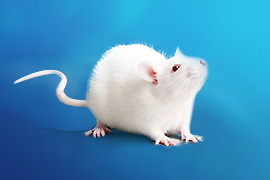Spafas Biotechnology Co., Ltd. can provide long-term or short-term experimental animal boarding services. Currently, boarding services include routine animal boarding, transgenic animal boarding, animal breeding and hybrid first-generation animal customization boarding services.
I. Animal Customization
1. Routine animal boarding: feed experimental animals according to requirements and ensure the status and quality of animals. Breed or expand according to customer requirements; 2. Transgenic animal boarding: breed a certain number of offspring mice according to the customer's required breeding method for a small amount of transgenic animals, and perform operations such as ear tagging, tail cutting, and toe cutting as required; 3. Hybrid first-generation animal customization boarding service: breed a certain number of hybrid first-generation mice according to the customer's specific strain requirements through scientific breeding according to customer needs.
II. Daily Feeding and Management of Animal Customization
Feed: Customized SPF-grade genetically modified rat feed or feed selected according to customer requirements, and feed small amounts of sterilized sunflower seeds as needed. Drinking water: High-pressure sterilized water. Bedding: High-pressure sterilized corn cob bedding, with added environmental enrichment materials. Cage replacement: At least once a week, all operations are carried out in the cage replacement station or ultra-clean workbench. Animal welfare: Follow AAALAC standards to ensure animal welfare during animal breeding and feeding. Supplier audit: has strict requirements for supplier audit and strictly controls the quality of external materials and animals.
III. Animal Customized Environment Control
Establish SPF-level barrier facility animal rooms and conduct quality control according to the standard of "GB14925-2010 Laboratory Animal Environment and Facilities".
-
 Wistar RatDeveloped by the Wistar Institute in the United States in 1907. In 2019, SpePharm (Beijing) Biotechnology Co., Ltd. introduced breeding from the National Rodent Laboratory Animal Seed Center.More
Wistar RatDeveloped by the Wistar Institute in the United States in 1907. In 2019, SpePharm (Beijing) Biotechnology Co., Ltd. introduced breeding from the National Rodent Laboratory Animal Seed Center.More -
 ICR miceIn 1926, the Rockfeller Institute of the United States introduced albino mouse from Switzerland to breed Swiss mouse; in 1948, it was introduced by the Philadelphia Cancer Institute and bred Ha/ICR. In 1973, it was introduced into China and in 2011, SPF (Beijing) Biotechnology Co., Ltd. introduced it from the National Rodent Experimental Animal Seed Center and bred it.More
ICR miceIn 1926, the Rockfeller Institute of the United States introduced albino mouse from Switzerland to breed Swiss mouse; in 1948, it was introduced by the Philadelphia Cancer Institute and bred Ha/ICR. In 1973, it was introduced into China and in 2011, SPF (Beijing) Biotechnology Co., Ltd. introduced it from the National Rodent Experimental Animal Seed Center and bred it.More








